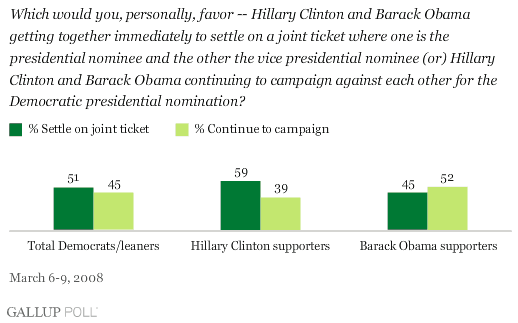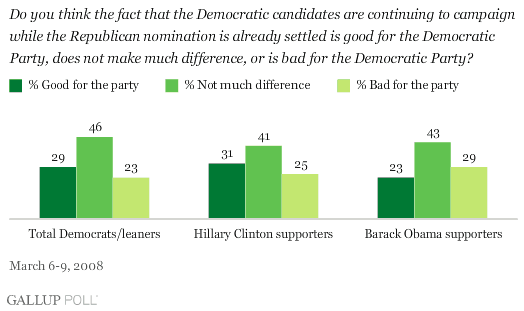PRINCETON, NJ -- Fifty-nine percent of Hillary Clinton supporters favor a quick decision to form a "dream ticket" with both Clinton and Barack Obama, while a majority of Obama supporters oppose the idea and would rather the campaign for the nomination continue.

Putting the sentiments of the two candidates' supporters together (and adding in a few undecideds), the overall results from the latest ║┌┴╧═Ї Poll, conducted March 6-9, show 51% of Democrats favoring an immediate settlement on a joint ticket between the two candidates, while 45% of Democrats think the candidates should soldier on. (Four percent have no opinion on the issue.)
One possible reason Clinton supporters are more likely than Obama supporters to favor negotiating a joint ticket now is that Clinton supporters may be more worried that she will lose if the campaigning continues. (Obama is currently ahead in numbers of pledged delegates, and most experts believe Clinton will have difficulty erasing that lead if the primaries and caucuses remain close contests.)
But a poll question asking who is thought most likely to win the nomination shows that both candidates' supporters believe their candidate will win, although there is slightly more optimism among Obama supporters. Seventy-one percent of Clinton supporters say they believe she will win the nomination, compared to a just slightly higher 83% of Obama supporters who say he will prevail. (More generally, 51% of all Democrats and leaners believe Obama will win, while 42% think Clinton will. But this marks a downtick in perceptions that Obama will emerge the victor; prior to Clinton's wins in the crucial Ohio and Texas primaries last week, 70% of Democrats thought Obama would win.)
The battle for the Democratic nomination -- if not stopped by some means -- could last at least as long as the Pennsylvania primary scheduled for April 22, and conceivably could continue into the summer and even up to and including the Denver convention at the end of August.
Some argue that this would be good for the Democrats because it keeps their race in the media spotlight and would therefore result in less coverage of the Republican nominee, John McCain. Others argue that the continuing campaign, with both Obama and Clinton focusing on the other candidate's negatives and faults, could end up hurting the eventual nominee, while at the same time allowing McCain to sail above the fray, raise funds, and, in general, focus on the November election.
National Democrats clearly have mixed feelings on this issue of the pluses and minuses of the continuing Democratic campaign. A plurality of 46% of Democrats say that the fact that the Democrats are continuing to campaign while the Republicans have decided on their nominee doesn't make much difference. While 23% say it is bad for the party, another 29% say it is good for the party. There is little significant difference between Clinton and Obama supporters in responses to this question.

Survey Methods
Results are based on telephone interviews with 1,012 national adults, aged 18 and older, conducted March 6-9, 2008. For results based on the total sample of national adults, one can say with 95% confidence that the maximum margin of sampling error is ┬▒3 percentage points. For results based on the sample of 528 Democrats or Democratic leaners, the maximum margin of sampling error is ┬▒5 percentage points.
In addition to sampling error, question wording and practical difficulties in conducting surveys can introduce error or bias into the findings of public opinion polls.
